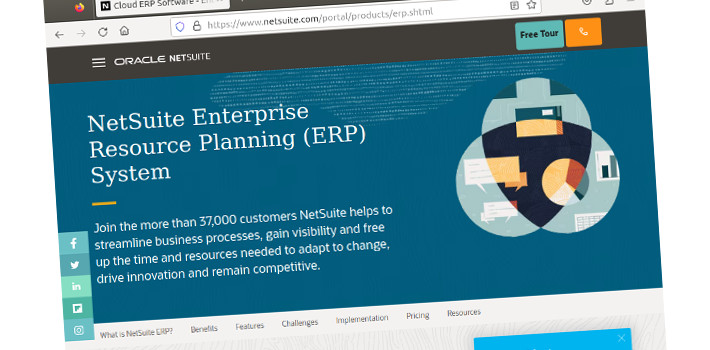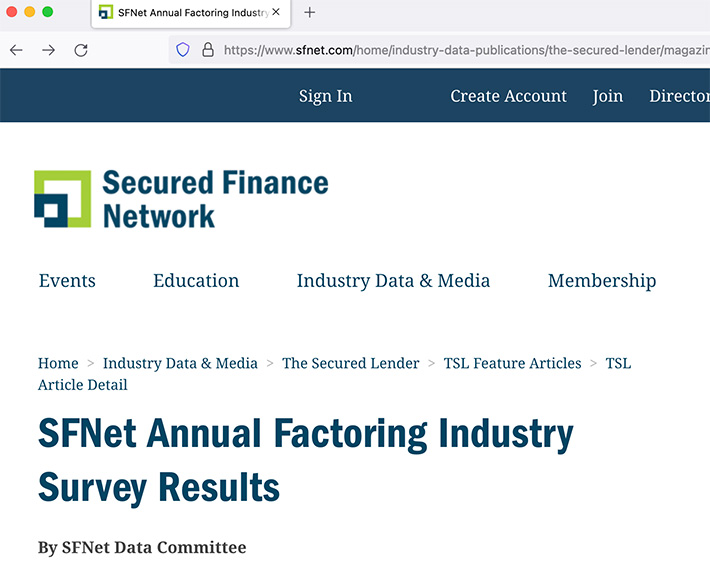Archive for 2023
NetSuite Introduces NetSuite Capital
October 22, 2023 NetSuite announced a series of new product innovations last week, including one named NetSuite Capital. NetSuite Capital is an embedded service that allows NetSuite customers to “accelerate payments and increase working capital by reviewing, pricing, and submitting invoices from accounts receivable for immediate payment.”
NetSuite announced a series of new product innovations last week, including one named NetSuite Capital. NetSuite Capital is an embedded service that allows NetSuite customers to “accelerate payments and increase working capital by reviewing, pricing, and submitting invoices from accounts receivable for immediate payment.”
NetSuite’s market is large. Over 25,000 businesses use it to process $1 trillion in invoices annually.
The technology that makes NetSuite Capital possible is powered by Raistone, a b2b finance payments company that has landed big partnerships including Mastercard, SAP, C2FO, and more. According to Raistone, “4 million companies submit and receive $6 trillion in invoices annually.”
NetSuite is a cloud ERP system that was acquired by Oracle in 2016. Unlike Quickbooks which is mainly an accounting software for small-to-midsize businesses, NetSuite is primarily for larger businesses that are looking for an all-in-one ERP solution.
Lending Industry Expert Joe Valeo Appointed President of SmallBusinessLoans.com
October 20, 2023NEW YORK SmallBusinessLoans.com (SBL) is pleased to announce the appointment of Joe Valeo as its new President. With over 35 years of experience in finance and sales, Valeo brings a breadth of knowledge to his executive leadership role at SBL, where he is committed to making the “right fit” lending solutions more accessible to small business owners.
In his previous positions, Valeo gained strategic development and consumer/business lending experience, serving financial services organizations such as LendingPoint, where he held the position of EVP/GM for POS merchant lending and direct-to-consumer loans. Before that, at Capital Access Network, he led sales strategy and management. His extensive background in payment services to merchants at First Data Corporation and Citicorp, managing e-commerce, ISOs, and franchises, as well as his experience managing acquirer and issuer relationships with key financial institutions at VISA, uniquely positions him to lead SBL to new heights.
Valeo’s vision for SmallBusinessLoans.com is straightforward and ambitious. His growth strategies include connecting with his deep finance industry network and implementing financial and business solutions to meet SMBs’ needs.
With his leadership, SmallBusinessLoans.com is positioned to:
- Be the preeminent destination for small businesses seeking financing and related business services digitally. The SBL platform cuts out time-consuming research and matches small businesses with trusted lenders who offer a variety of financing to suit every business need.
- Provide a simple, efficient application journey to help small businesses qualify for the right product and solution, ensuring easy access to financing and business services.
- Assist business owners in meeting immediate financing needs, helping them thrive in the long run. SBL serves various industries, including agriculture, commercial trucking, construction, landscaping, medical practices, and more.
Known for his problem-solving skills and quick thinking, Valeo is excited about leading a team of dedicated bridge-builders who will connect businesses and consumers to the funding they need to build their businesses and improve their lives. His commitment to customer-centric solutions makes him an ideal fit for SBL.
Valeo expressed his enthusiasm for his new role, “I strongly believe we’re doing something special, different, and market leading. Our mission is to provide a simple and easy way for businesses to access financing and business solutions.”
As passionate advocates for small businesses, Valeo and the SBL team are eager to converse with potential partners and business owners seeking small business financing and operations solutions.
For more information and to connect with us, please visit us at: www.SmallBusinessLoans.com.
About SmallBusinessLoans.com (SBL)
SmallBusinessLoans.com (SBL) helps small business owners connect with their best financing solution. With a commitment to simplifying the lending process and making it easy for business owners to find trusted, reliable lenders, the SBL platform matches business owners with lenders who offer fast funding, flexible terms, personalized options, and more to help small businesses thrive. SBL aims to become the go-to digital destination for small businesses seeking financing and business services. For more information, go to www.SmallBusinessLoans.com
Contact:
Susan Almon-Pesch
sue@speschialpr.com
858-205-0516
Maxim Commercial Capital Doubled Fundings in Q3 2023
October 19, 2023LOS ANGELES, CALIF. (Oct. 17, 2023) – Maxim Commercial Capital (“Maxim”) announced robust demand across its diverse financing programs for the third quarter of 2023. The hard asset secured lender reported a 100% year-over-year increase in truck financings for the period. Furthermore, it experienced a surge in demand for second-lien mortgages to refinance Merchant Cash Advance (MCA) loans and to support working capital. Maxim is a national provider of loans and leases from $10,000 to $3 million collateralized by class 6 and 8 trucks, trailers, heavy equipment, and real estate.
“The current climate of healthy residential real estate valuations, coupled with low-cost first mortgages and conservative banking practices, makes our Real Estate and Structured Finance programs highly appealing,” noted Michael Kianmahd, Maxim’s Executive Vice President. “Many homeowners don’t realize they have liquidity in their homes that can be tapped to grow their businesses, often at significantly less expense than MCA loans.”
Notable fundings during the period include a $400,000, 5-year second-lien mortgage at a 60% combined loan-to-value (LTV) for an experienced optometrist with four business locations in Los Angeles. The funds were used to pay off MCA loans, reducing monthly debt service by $15,000, and for working capital. Maxim also funded aa $125,000 second-lien mortgage to an experienced construction project manager in Las Vegas at 58% combined LTV to fuel business growth and pay off an expensive MCA loan.
Maxim’s credit matrix featuring lower down payments for truck owner-operators, ranging from better credit to subprime borrowers, continued to prove popular among loan brokers and truck vendors in Q3 2023. Truck financings during the period included 75% purchase financing for an experienced owner-operator with a 607 FICO to buy a 2018 Peterbilt 579 with 399K miles for $58,695; 68% purchase financing for an owner-operator with a 593 FICO to buy a 2019 Peterbilt 579 with 547k miles for $62,250; and 71% financing for a start-up owner-operator with a 618 FICO to buy a 2020 Freightliner Cascadia with 465K miles for $51,275.
“Fortunately, the used truck market has softened in light of the current economic volatility “We are committed to helping hard-working truck drivers stay on the road, earning a living,” noted said Behzad Kianmahd, Maxim’s Chairman and CEO. “The current economic volatility has improved truck pricing while also causing some lenders to retract, creating an opportunity for Maxim to fill a void.”
About Maxim Commercial Capital
Maxim Commercial Capital helps small and mid-sized business owners nationwide by providing loans and leases (“financing”) from $10,000 to $3 million secured by trucks, trailers, heavy equipment, and real estate. It funds equipment purchase financings and leases, working capital, and debt consolidations. Maxim’s more creative financing structures leverage equity in real estate and owned heavy equipment to facilitate growth and preserve customers’ cash. As a leading provider of transportation equipment financing, Maxim supports startup and experienced owner-operators and non-CDL small fleet owners by funding loans and leases for class 8 and class 6 trucks, trailers, and reefers. Learn more at www.maximcc.com or by calling 877-776-2946.
###
Contact:
Michael Kianmahd
Executive Vice President
Maxim Commercial Capital
michael@maximcc.com
(213) 984-2727
With Fraud on the Rise, AI Can Fill in the Gaps
October 19, 2023 In today’s dynamic world of fraud detection, technology, and artificial intelligence (AI) are allies. The insights of industry experts, Yinglian Xie, a technology veteran with a background at Microsoft Research and CEO at DataVisor, Sandip Nayak, President at Fundation, and Andrew Davies, Global Head of Regulatory Affairs at ComplyAdvantage, discuss the transformative role of AI in fraud prevention.
In today’s dynamic world of fraud detection, technology, and artificial intelligence (AI) are allies. The insights of industry experts, Yinglian Xie, a technology veteran with a background at Microsoft Research and CEO at DataVisor, Sandip Nayak, President at Fundation, and Andrew Davies, Global Head of Regulatory Affairs at ComplyAdvantage, discuss the transformative role of AI in fraud prevention.
When DataVisor started, it primarily offered advanced machine learning solutions, through an unsupervised approach. In other words, their programs can spot fraud without needing a loss or training labels; they can automatically identify suspicious activities. Xie explains that AI’s ability to make rapid decisions during real-time transactions depends on the amount of data available for this process. To achieve a proactive response, it must be synchronized with real-time data, as opposed to a manual or “supervised machine learning” approach.
“We need to kind of switch the traditional approach looking at fraud being very much kind of an isolated case, like a manual approach, and into something we need technology for, said Xie. “And we need to essentially be able to make decisions instantaneously as well.”
In addition to unsupervised learning algorithms, Xie explains that generative AI falls into another category of fraud detection. This method describes the data and communicates information back in human-like responses. Xie gives an example that as customers, some may not understand why a transaction was rejected and that’s where generative AI comes to rationalize the reason behind the rejection.
Echoing Xie, Nayak described solutions where traditional techniques fail, one of them being unsupervised learning algorithms. These algorithms can use techniques like anomaly detection to actually hone in on “the needle in a haystack problem.”
“Number two, the automated and advanced nature of AI can really solve the shortcomings of rules based and human based approaches in detecting fraud and can also self-calibrate itself as the nature of fraud evolves with time,” said Nayak.
Meanwhile, Andrew Davies pointed out that one of the biggest challenges faced by banks and financial institutions is “they are constantly playing catch-up.” With the accelerated pace of money movement and real-time settlement, he emphasized that fraudsters capitalize on this by being swift and innovative, continuously seeking out new vulnerabilities to exploit.
“Banks must update their legacy technology which leaves too many weak points in the control environment,” said Davies. “Additionally, as money moves more quickly and is subject to finality, fraud detection must be done in real time.”
And as the digital landscape continues to evolve, Nayak envisions the adoption of these technologies will be beneficial to the lending industry. Embracing different strategies not only reduces fraud losses but also enhances capital efficiency, paving the way for increased profitability and security in lending, according to Nayak.
“I do expect the lending industry, especially the ones who adopt the latest technologies of fraud detection, will have a competitive advantage compared to those who don’t,” said Nayak. “And what that will do is it will help them preserve more of their capital in the current tough macro environment by helping the overall unit economics…”
Unsupervised machine learning and generative AI are strategies reshaping fraud prevention. The ability to make rapid, data-driven decisions, adapt to evolving fraud tactics, and provide human explanations behind alerts has become a cornerstone in modern fraud detection.
Whoa, That’s a Lot of Bad EIDL Loans
October 19, 2023 When the SBA revealed it had charged off $220M worth of covid-related EIDL funds before the first payment on any of those loans was even due, it suggested that things were not going to go well. Payments on just the earliest issued loans started at the end of last year and by March the SBA made a shocking disclosure. $62 billion worth of loans were already delinquent. This number is all the more alarming when put into the perspective that there were only $380B in EIDL funds loaned total. That means that 16% went bad straight out of the gate.
When the SBA revealed it had charged off $220M worth of covid-related EIDL funds before the first payment on any of those loans was even due, it suggested that things were not going to go well. Payments on just the earliest issued loans started at the end of last year and by March the SBA made a shocking disclosure. $62 billion worth of loans were already delinquent. This number is all the more alarming when put into the perspective that there were only $380B in EIDL funds loaned total. That means that 16% went bad straight out of the gate.
Oh, and this number is growing and the SBA is feeling overwhelmed to the point where they’re not even trying to collect on many loans.
“…the SBA had already decided that it would not take the most aggressive actions possible to pursue borrowers who received loans worth $100,000 or less,” the Washington Post reported.
This strategy has not been well received by Office of Inspector General Hannibal Ware. In a letter Ware wrote to SBA Administrator Isabella Guzman on September 29, he said, “SBA’s decision to cease collections risks violating the Debt Collection Improvement Act of 1996, which prohibits ending collections on fraudulent, false, or misrepresented claims, because SBA OIG and other oversight agencies are continuing to work on identifying COVID-19 EIDL fraud that may not have been identified by the agency. It is also unclear whether SBA plans to end active collections on loans for borrowers who received multiple COVID-19 EIDLs of $100,000 or less that, when combined, exceed $100,000.”
Unlike PPP loans, which if not forgiven had to be repaid in full within two years, the EIDL program extended very generous terms with a 30 year repayment schedule.
The OIG has asked the SBA to evaluate the possibility of selling a portion of its EIDL debt to maximize the return to taxpayers.
Survey: Factoring Sector of Finance Industry Shows Resilience Despite Decreased Volume
October 18, 2023Secured Finance Network Releases Mid-Year Report
 NEW YORK, NY, Oct. 16, 2023 ─ The factoring sector began 2023 on a positive note and has continued to show resilience in an uncertain economy, according to the MidYear Factoring Industry Survey, released by the Secured Finance Network (SFNet). The survey included the Factoring Confidence Index, which found that despite a lingering threat of recession, member organizations are optimistic about the demand for new business and portfolio performance. General business conditions and industry employment levels, meanwhile, were predicted to remain the same.
NEW YORK, NY, Oct. 16, 2023 ─ The factoring sector began 2023 on a positive note and has continued to show resilience in an uncertain economy, according to the MidYear Factoring Industry Survey, released by the Secured Finance Network (SFNet). The survey included the Factoring Confidence Index, which found that despite a lingering threat of recession, member organizations are optimistic about the demand for new business and portfolio performance. General business conditions and industry employment levels, meanwhile, were predicted to remain the same.
“The overall outlook for the U.S. economy has improved in recent months due to strong consumer spending and easing inflation,” the report said. “The odds of a ‘soft-landing’—a further easing of inflation without a recession—have increased somewhat, but recession risks remain.”
Factoring is the process by which a buyer—a non-bank lender or bank affiliate referred to as a “factor”—purchases the accounts receivable of a client, at a discount. Clients are typically companies involved in textiles, apparel, business services, shipping, transportation and other industries that want to improve cash flow, according to SFNet.
Factoring activity
This industry, like many others, continues to feel the pressures of a post-pandemic economy. Overall factoring volume in the first half of this year decreased by 13.5% compared to the same period in 2022, the report said. U.S. volume was down 13.3% and international volume fell by 23.7%. Apparel/textiles remained the top client industry for volume at 30.2% after holding a similar position in SFNet surveys in recent years.
“The number of factoring clients edged down by 0.3% from H1 2022 to H1 2023,” the report said, “with U.S. clients dropping by 0.4% and international clients increasing by 5.7% over the same period. Banks and brokers were the top two sources of client referrals, accounting for over half of all referrals during those periods.”
Regionally, there was little change year-over-year in factoring volume and clients, the report said, but the distribution of volume was notably different from the distribution of clients. The Northeast had the highest share of volume in the first half of this year (58%), but the Southeast had the highest share of clients (27%).
“Non-recourse factoring continued to comprise the vast majority of total volume (85.9%) while full recourse factoring comprised the majority of clients (81.8%),” the report said. “Notification factoring comprised a slight majority of volume (51.1%), with its share of volume declining steadily from H2 2021 (77.0%). Notification factoring still comprised the vast majority of clients (96.5%) and was relatively unchanged.”
More factoring survey highlights:
- Average loan turnover saw a slight increase to 47.8 days in the first half of 2023 and average days sales outstanding also rose, to 50.7.
- For portfolios, write-offs were up slightly from the same period in 2022 as a share of volume, from 0.04% to 0.11%. Provisions for loan loss accounted for 0.44% of volume.
- Factoring revenues decreased by 26% from midyear 2022, with net interest revenue holding steady at 58%. The share of service fees, meanwhile, saw a slight increase.
- Average return on assets rose 4.2% while average return on equity increased 15.2%, the report said. Survey respondents reported pre-tax income at 0.63% of volume in the first half of this year.
- The number of employees in factoring grew from the previous two quarters, but not by much: 1.2%.
Details
Follow the link for more publicly available information on the MidYear Factoring Industry Survey. SFNet members have access to additional data and detailed reporting.
About Secured Finance Network
Founded in 1944, the Secured Finance Network (formerly Commercial Finance Association) is an international trade association connecting the interests of companies and professionals who deliver and enable secured financing to businesses. With more than 1,000 member organizations throughout the US, Europe, Canada and around the world, SFNet brings together the people, data, knowledge, tools and insights that put capital to work. For more information, please visit SFNet.com.
Media Contact:
Michele Ocejo, Director of Communications
Secured Finance Network
mocejo@sfnet.com, 551-999-5283
Addressing Misconceptions in the MCA Business
October 18, 2023 New to the MCA business? Think you got it figured out? Let’s visit some of the stranger beliefs and misconceptions I’ve encountered over the last year. (Not legal advice as I am not an attorney).
New to the MCA business? Think you got it figured out? Let’s visit some of the stranger beliefs and misconceptions I’ve encountered over the last year. (Not legal advice as I am not an attorney).
My broker/funding company’s legal address as recorded with the Secretary of State or courts is my personal information and no one is allowed to know it or share it on the internet.
False. The business address you place on file with governmental authorities or courts is generally available to the public. If you opt to use your home address as your business address, just know that it will be open to everyone to see and share. Additionally, starting Jan 1. 2024, any broker soliciting merchants that reside in Florida will have to take the additional measure of including their official business address in their marketing to the merchant. So no, you are not entitled to complete anonymity.
I can fund in all 50 states!
But can you though? If you offer loans, there are a number of state laws that govern the legality of that. If you offer MCAs, there are states like Virginia for which you are required to be registered by law (applies to both funders and brokers). There are penalties for not following the laws.
I don’t need any fancy systems to be a funder
Well you’re going to need something. In the not too distant future you will be required to comply with 888 pages of regulations governing how you can collect merchant data all while having to report the details of every single application you looked at in addition to every single deal you declined or funded to the federal government. You also have to explain the rationale for your decision in every instance. This includes MCA and yes it’s a law not a proposal. I hope you’re ready.
MCA is legal so I don’t need to worry about anything
There are legal precedents that guide what can or can’t be done with regards to the purchase of future receivables. Generally speaking (and please consult with an attorney), one’s right to collect is not absolute. See this recent case, for example.
I sent some deals out to some shady funders who have gone MIA and no longer take my calls. The funder is to blame and is bad
Most brokers who cry foul about no-name fly-by-night funders that offered swift approvals and high commissions only to be ghosted are quick to share that they were swindled out of a potential commission. No one likes to suffer through that. However, consider the legal risk now posed to yourself and your client with the information you’ve passed on. In a recent criminal case, an ISO managing merchant documents is alleged to have stolen their identities and obtained dozens of business loans in their names. So ask yourself on a scale of 1 – 10, how confident are you in the person/company you’re passing a merchant’s deal docs to that they will comply with all state and federal laws? Your commission might not be the only thing they steal and that creates legal hazard for you. For what it’s worth, he’s a good guy isn’t a great standard when it comes to legal due diligence.
As always, please consult a qualified attorney. If you are being solicited by a funder that has not sought any legal advice at all and is instead operating by the seat of their pants because they heard this was a good business, you should probably move on to someone else.
ISO Arrested by FBI
October 18, 2023 A merchant processing ISO was arrested by federal agents this week for his alleged role in a business loan fraud scheme. Paul Paredes, who owns J&E Business Consulting LLC in Rochester, NY, allegedly used the identities of his merchant processing clients to obtain business loans for himself.
A merchant processing ISO was arrested by federal agents this week for his alleged role in a business loan fraud scheme. Paul Paredes, who owns J&E Business Consulting LLC in Rochester, NY, allegedly used the identities of his merchant processing clients to obtain business loans for himself.
“Small businesses provide J&E with their financial information, such as the owner’s identifying information, including driver’s license, social security number, and email, as well as bank account information,” the Assistant US Attorney said.
According to the complaint, between May and November 2022, Paredes fraudulently submitted approximately 42 loan applications using the identities of approximately 31 individuals, enabling him to obtain millions of dollars. He used the money to pay off one victim, pay other loan companies, and he used it on personal expenses such as credit cards, travel, and vehicles.
Paredes is also facing a related civil lawsuit over the matter. According to public records, his company has also used and defaulted on several merchant cash advances from as far back as 2016 to as recent as this year.
“Although a comprehensive analysis of all known accounts has not yet been completed, the financial transactions in the [bank] accounts appear to be consistent with Paredes laundering the fraudulent loan proceeds obtained from the lender companies, which are proceeds of a Specified Unlawful Activity, namely wire fraud, in a similar fashion to a ‘Ponzi scheme’ and inconsistent with the operations of a legitimate business enterprise,” an FBI agent said in an affidavit.





























